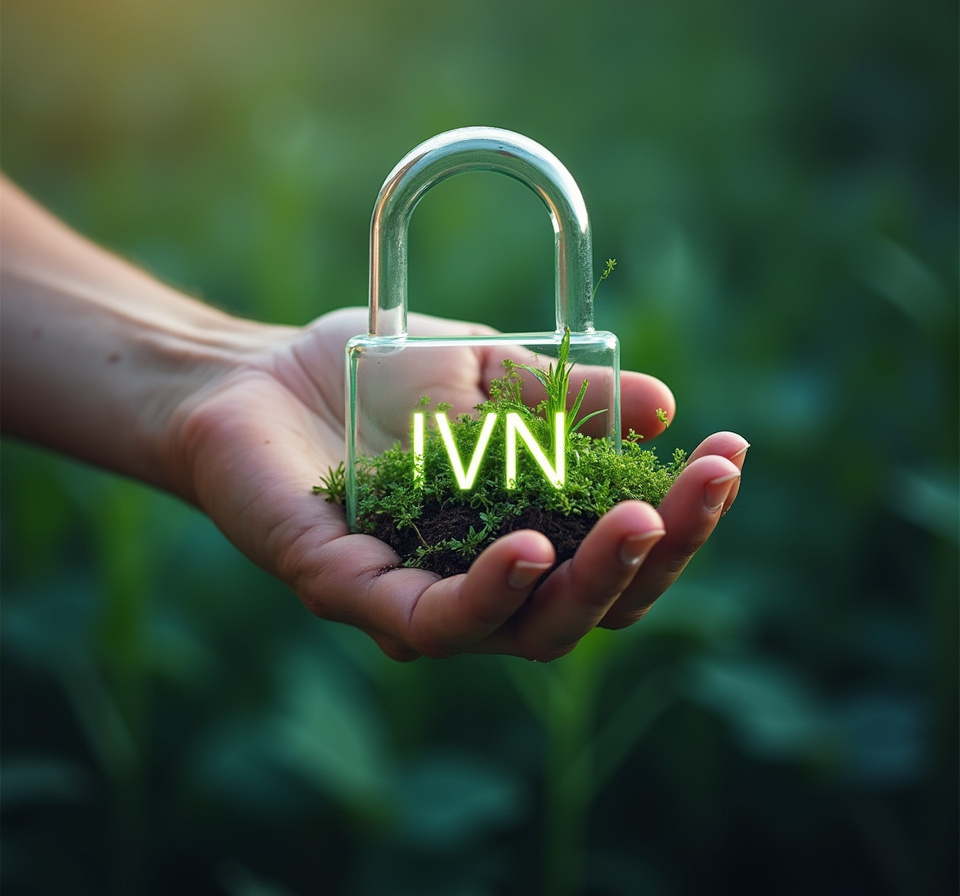VPNs for Agricultural Data: Safeguarding Farm Insights

Table of Contents
VPNs for Agricultural Data: Safeguarding Farm Insights and Cultivating Trust
The modern agricultural landscape is increasingly reliant on data. From precision farming techniques that optimize crop yields to sophisticated livestock management systems, data-driven insights are transforming the way we grow and produce food. However, this digital revolution also introduces a new set of challenges, particularly concerning data security.
This article delves into the critical role of Virtual Private Networks (VPNs) in safeguarding agricultural data, protecting invaluable farm insights, and fostering a secure environment for research and innovation. We'll explore the vulnerabilities inherent in agricultural data networks, the benefits of utilizing a secure VPN, and how these tools contribute to the overall resilience and competitiveness of the agricultural sector. The agricultural industry, traditionally rooted in manual processes and intuitive knowledge, has undergone a significant transformation fueled by technological advancements.
Precision agriculture, the Internet of Things (IoT), and sophisticated data analytics have revolutionized farming practices. Farmers now collect and analyze vast amounts of data related to soil conditions, weather patterns, crop yields, water usage, and livestock health. This data enables them to make informed decisions about planting, fertilization, irrigation, and pest control, leading to increased efficiency, improved yields, and reduced environmental impact.
The integration of technology into agriculture has unlocked unprecedented opportunities for optimization and innovation. However, this reliance on data also presents significant security risks. As agricultural operations become increasingly interconnected and data-driven, they become more vulnerable to cyber threats.
Protecting sensitive information, such as crop pricing strategies, proprietary breeding techniques, and financial records, is crucial for maintaining a competitive edge and ensuring the long-term sustainability of the agricultural sector. A single data breach can have devastating consequences, ranging from financial losses and reputational damage to the disruption of critical supply chains. Therefore, implementing robust security measures, including the use of agricultural VPNs, is essential for safeguarding farm insights and mitigating potential risks.
The convergence of technology and agriculture has expanded the attack surface, creating new opportunities for cybercriminals to exploit vulnerabilities. Farms often rely on a complex network of interconnected devices, including sensors, drones, automated machinery, and cloud-based platforms. These devices, while providing valuable data and automating tasks, can also serve as entry points for malicious actors.
Many agricultural devices lack robust security features and are easily compromised, allowing attackers to gain access to sensitive data or disrupt critical operations. The remote locations of many farms and the limited availability of cybersecurity expertise in the agricultural sector further exacerbate these vulnerabilities. Protecting agricultural data requires a multi-layered approach that includes strong passwords, regular software updates, and employee training.
However, these measures alone are often insufficient to protect against sophisticated cyber threats. An agricultural VPN provides an additional layer of security by encrypting data transmissions, masking IP addresses, and creating a secure tunnel for accessing sensitive information. By implementing a VPN, farmers and agricultural researchers can significantly reduce their risk of data breaches and protect their valuable insights from unauthorized access.
Furthermore, a VPN can facilitate secure collaboration among researchers, enabling them to share sensitive data without compromising its confidentiality. In an increasingly interconnected world, where data is a valuable asset, agricultural VPNs play a vital role in safeguarding farm insights and fostering a secure environment for innovation and growth. The importance of protecting agricultural data cannot be overstated.
It is essential for ensuring the long-term sustainability of the agricultural sector, maintaining a competitive edge, and safeguarding the food supply. By embracing agricultural VPNs and other cybersecurity best practices, farmers and researchers can protect their valuable insights and cultivate a future where data-driven agriculture thrives in a secure and resilient environment and build a future where the farms will have better yields.
Harvesting Data, Sowing Risks: Understanding Vulnerabilities in Agricultural Networks
The agricultural sector faces a unique and evolving landscape of vulnerabilities that make protecting farm insights a constant challenge. Understanding these specific vulnerabilities is crucial for implementing effective security measures. One of the most significant challenges stems from the geographically dispersed nature of agricultural operations.
Farms often span vast areas, relying on remote sensors, drones, and other IoT devices that collect data from diverse locations. This distributed infrastructure expands the attack surface, making it difficult to monitor and secure all potential entry points. Furthermore, many rural areas lack reliable internet connectivity, forcing farmers to rely on less secure options such as cellular networks or satellite connections, which are more susceptible to interception and eavesdropping.
This lack of robust infrastructure creates a significant vulnerability that can be exploited by malicious actors. Another critical vulnerability lies in the proliferation of IoT devices within the agricultural sector. While these devices offer numerous benefits, they often lack robust security features and are easily compromised.
Many agricultural sensors, for example, are designed with minimal security protocols, making them vulnerable to hacking. A compromised sensor could transmit false data, leading to inaccurate insights and flawed decision-making. Similarly, drones and automated machinery, if not properly secured, could be hijacked and used to disrupt farm operations or steal sensitive information.
The sheer volume of IoT devices on a modern farm significantly increases the risk of a successful cyberattack and therefore the costs related. Moreover, the agricultural sector's increasing reliance on cloud-based services introduces new vulnerabilities. Cloud platforms offer a convenient and cost-effective way to store, analyze, and share agricultural data.
However, improper configuration of cloud settings, weak access controls, or vulnerabilities in the cloud provider's infrastructure can expose sensitive data to unauthorized access. Farmers must carefully manage their cloud security settings and ensure that their data is adequately protected, utilizing multifactor authentication and other security best practices. A failure to do so can result in costly data breaches and reputational damage that can lead to significant economical losses.
The specific types of data collected and stored by agricultural organizations also make them attractive targets for cybercriminals. Proprietary crop breeding information, livestock genetics, soil analysis reports, market predictions, and financial records are all highly valuable assets. The theft of this data could provide competitors with a significant advantage, undermine research efforts, or result in financial losses.
Protecting intellectual property is particularly crucial for agricultural research institutions and companies that invest heavily in developing new technologies, so they can retain the competitive advantage, the ROI and the possibility of keep investing in research for better solutions. Ransomware attacks are also becoming increasingly prevalent in the agricultural sector. Cybercriminals encrypt critical data and demand a ransom for its release, disrupting farm operations and causing significant financial losses.
A successful ransomware attack can halt planting or harvesting activities, disrupt supply chains, and damage brand reputation. Farmers must implement robust backup and recovery procedures to minimize the impact of ransomware attacks and ensure business continuity. They must also invest in security awareness training for employees to prevent phishing attacks and other social engineering tactics that are often used to deliver ransomware as well as keep the staff prepared against the newest methods employed by cybercriminals, so the human factor, which always is a weakeness of almost every system, can be minimalized and turned it into a strength.
Understanding these vulnerabilities and implementing appropriate security measures, including the use of agricultural VPNs, is essential for protecting farm insights and ensuring the long-term success and sustainability of the agricultural sector. The next step should be start working on mitigation strategies.
TBA
An agricultural VPN acts as a vital shield, fortifying the security of sensitive data as it traverses the often-unprotected pathways of the internet. Through the implementation of robust encryption protocols, a VPN establishes a secure and impenetrable tunnel, effectively preventing unauthorized access, eavesdropping, and the interception of valuable information. This is particularly crucial when farmers and agricultural professionals rely on public Wi-Fi networks, which are notoriously vulnerable to hacking and data breaches.
Envision a scenario where a farmer is accessing critical weather data, real-time market prices, or livestock health reports from a local café or a shared workspace – without the protective embrace of a VPN, this sensitive information could be easily intercepted by malicious actors lurking on the same network. An agricultural-specific VPN ensures that all data transmitted, regardless of its nature or destination, is encrypted using advanced algorithms, rendering it unreadable and unintelligible to any unauthorized parties attempting to intercept or access it. Beyond its encryption capabilities, an agricultural VPN also serves as a powerful tool for masking the user's IP address, providing an additional and indispensable layer of anonymity and significantly hindering the ability of attackers to trace the user's online activity back to their physical location or device.
This is particularly important for agricultural researchers, scientists, and breeders who may be engaged in sensitive research projects or the development of proprietary technologies, cutting-edge innovations, or novel farming methods. By concealing their IP address, they can effectively protect themselves from unwarranted surveillance, prevent competitors from gaining unauthorized insight into their research endeavors, and safeguard their intellectual property from potential theft or infringement. The strategic deployment of VPN servers in diverse geographical regions offers additional advantages to the agricultural sector.
By connecting through a server located in a different region or country, farmers and agricultural professionals can effortlessly bypass geo-restrictions and gain access to data, services, or resources that may be unavailable or restricted in their home location. This capability is particularly valuable for accessing international market information, collaborating with research institutions and experts in other parts of the world, or participating in global agricultural trade events and conferences. A geographically diverse network of VPN servers empowers farmers and agricultural stakeholders to remain connected, informed, and competitive in an increasingly globalized marketplace, fostering innovation and driving economic growth.
Furthermore, an agricultural VPN significantly enhances the security of remote access to farm systems, machinery, and data. Many modern farms rely on remote monitoring and control systems, allowing farmers to manage irrigation, adjust climate control settings in greenhouses, operate automated machinery, and monitor livestock health from their smartphones, tablets, or laptops. An agricultural VPN ensures that these remote connections are secure, preventing unauthorized access to critical farm systems and mitigating the risk of remote exploitation by cybercriminals.
This is especially important as farms continue to adopt IoT devices and integrate interconnected systems, creating a more complex and potentially vulnerable digital infrastructure. The deployment of agricultural VPNs can also incorporate additional security features, such as integrated malware protection and intrusion detection systems, providing a more comprehensive and proactive security solution for sensitive agricultural data. These advanced features actively identify and prevent malicious activity, protecting farm systems from viruses, spyware, ransomware, and other emerging cyber threats.
By combining encryption, IP address masking, geo-spoofing, secure remote access, and advanced threat detection, an agricultural VPN provides a robust and multi-faceted security solution tailored to the unique needs of the agricultural sector, safeguarding valuable farm insights and promoting a secure and resilient farming ecosystem.
VPNs for Services
Agricultural research forms the bedrock of innovation and progress within the sector, driving advancements in crop yields, enhancing pest control strategies, promoting sustainable farming practices, and developing innovative technologies. Protecting the integrity, confidentiality, and availability of this research data is paramount, not only for the researchers themselves but also for the broader agricultural community and the future of food security. A data breach compromising agricultural research could have far-reaching consequences, potentially delaying crucial breakthroughs, undermining public trust in scientific findings, and jeopardizing the competitive advantage of research institutions and agricultural companies.
In this context, the implementation of robust security measures, including agricultural VPNs, is essential to safeguard intellectual property and foster a secure environment for collaborative research and innovation. One of the primary benefits of utilizing a VPN in agricultural research is the protection of sensitive data during transmission and storage. Researchers often need to share data with colleagues, collaborators, and funding agencies located in different geographical locations.
A VPN ensures that this data, which may include proprietary breeding information, genetic sequences, experimental results, and confidential research findings, is encrypted and protected from unauthorized access during transit across the internet. Furthermore, a VPN can provide secure access to research databases, online libraries, and other restricted resources, enabling researchers to conduct their work without fear of interception or surveillance. Academic institutions and research organizations can leverage VPNs to create secure virtual enclaves, allowing researchers to collaborate on sensitive projects while maintaining strict control over data access and security.
This is particularly important in international research collaborations, where data protection laws and regulations may vary significantly. Another crucial aspect of research security is the protection of intellectual property rights. Agricultural research often leads to the development of new crop varieties, innovative farming techniques, and cutting-edge agricultural technologies.
Protecting these innovations from unauthorized use or exploitation is essential for incentivizing further research and ensuring that the benefits of agricultural advancements are realized by the rightful owners. A VPN can help researchers and agricultural companies protect their intellectual property by masking their IP addresses, preventing competitors from monitoring their online activities, and securing their communications channels. Moreover, VPNs can be used to access and monitor online marketplaces and forums, enabling researchers to detect and address potential infringements of their intellectual property rights.
The implementation of agricultural VPNs also contributes to the overall security posture of research institutions and agricultural companies. By encrypting data, masking IP addresses, and providing secure access to sensitive resources, a VPN reduces the risk of data breaches, ransomware attacks, and other cyber threats that could compromise research data and disrupt research operations. A robust cybersecurity strategy, including the use of VPNs, demonstrates a commitment to protecting intellectual property, fostering innovation, and maintaining the trust of stakeholders, including funding agencies, collaborators, and the public.
In an increasingly interconnected world, where agricultural research is conducted on a global scale, VPNs are an essential tool for protecting intellectual property, fostering collaboration, and ensuring the long-term sustainability of agricultural innovation. The VPN represents a key solution to preserve and expand the investigation efforts, which will bring benefits for everyone.
TBA
In conclusion, the integration of Virtual Private Networks (VPNs) into agricultural operations is no longer a mere suggestion but a critical necessity for safeguarding valuable farm insights and ensuring the long-term sustainability and security of the sector. From protecting sensitive research data and intellectual property to mitigating the risks associated with interconnected devices and cloud-based services, agricultural VPNs offer a robust and versatile solution to address the unique cybersecurity challenges facing modern agriculture. As farms become increasingly reliant on data-driven decision-making and interconnected technologies, the vulnerabilities to cyber threats continue to grow, making the implementation of comprehensive security measures paramount.
By embracing agricultural VPNs and other cybersecurity best practices, farmers, researchers, and agricultural technology providers can cultivate a secure digital environment, fostering innovation, promoting collaboration, and safeguarding the food supply for future generations. The benefits of utilizing agricultural VPNs extend beyond mere data protection. By encrypting data transmissions and masking IP addresses, VPNs enhance the overall privacy and anonymity of agricultural operations, preventing unauthorized surveillance and protecting sensitive business information.
This is particularly important in an era where data breaches and privacy violations are becoming increasingly common. Furthermore, VPNs can enable secure remote access to farm systems, allowing farmers to monitor and control their operations from anywhere in the world without compromising security. This enhanced accessibility and flexibility can improve efficiency, reduce costs, and empower farmers to make more informed decisions in real-time.
The implementation of agricultural VPNs also contributes to building trust and confidence among stakeholders, including customers, suppliers, and investors. By demonstrating a commitment to data security and privacy, agricultural organizations can enhance their reputation, strengthen their relationships with key partners, and attract new opportunities for growth and collaboration. As the agricultural sector continues to evolve and embrace new technologies, the importance of cybersecurity will only continue to grow.
Farmers, researchers, and agricultural technology providers must proactively address the emerging threats and implement robust security measures to protect their valuable data and intellectual property. Agricultural VPNs represent a crucial component of a comprehensive cybersecurity strategy, providing a cost-effective and readily available solution to mitigate many of the risks associated with modern agricultural operations. However, it's important to remember that a VPN is just one piece of the puzzle.
A holistic approach to cybersecurity includes strong passwords, regular software updates, employee training, and robust backup and recovery procedures. By combining these measures with the implementation of agricultural VPNs, the agricultural sector can create a resilient and secure digital ecosystem that fosters innovation, promotes collaboration, and safeguards the food supply for future generations. The future of agriculture is undeniably intertwined with technology, and ensuring the security of that technology is paramount to the success and sustainability of the sector.
By prioritizing cybersecurity and embracing agricultural VPNs, we can cultivate a future where data drives innovation and progress without compromising the security and integrity of our food systems. The time to act is now, and the rewards of a secure agricultural sector will be reaped by all.
Stay Updated
Get the latest VPN news, tips, and exclusive deals to your inbox.




